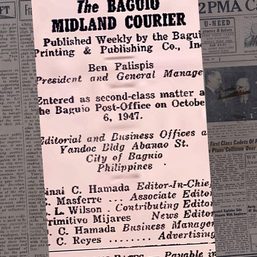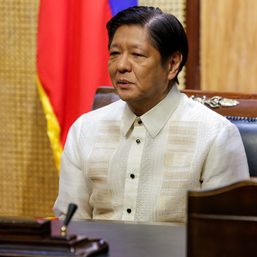SUMMARY
This is AI generated summarization, which may have errors. For context, always refer to the full article.
![[Just Saying] Marcos: A flat response, a missed opportunity](https://www.rappler.com/tachyon/2024/04/tl-marcos-flat-response-april-16-2024.jpg)
Last April 15, 2024, President Ferdinand Marcos Jr. held an open forum at the Foreign Correspondents Association of the Philippines (FOCAP) 50th anniversary. During the forum, he was asked about why he had yet to issue an apology for atrocities committed during his father’s rule, the late dictator Ferdinand E. Marcos. To this line of questioning, Marcos Jr. replied:
Well, I don’t think it is a duty for [the] President to be involved. That is a personal matter for the Marcos family…Definitely. The role of the president is more important right now than my role as a member of the Marcos family. So I think that’s my first priority.
This was, glaringly, a missed opportunity for the President.
Despite what his answer implies, the President’s identity as a member of the Marcos family is inextricably linked to his position now as president. Certainly, he would not have gotten the latter without both machinery and mythology of the Marcoses behind him. Which is why it boggles the mind as to why his responses to these inevitable questions remain flat, uninspired, and even cowardly, if we are being crass. More than anything, they are truly missed opportunities for transcendent statesmanship, which any president worth his or her salt should be raring to take advantage of.
Of course, those of us who survived the fight against Martial Law would prefer he make an unqualified, sincere, and express apology, full stop. This is the ideal. We are also, however, not idiots. We know that President Marcos would never do this directly. He is not about to prostrate himself before the feet of Martial Law victims and shed tears. This is mere fantasy, and we would all be doing ourselves a favor to stop expecting it.
What the President should, however, be able to do is rise to the occasion and give meaning to what already exists in our long-standing national policies – those that denounce his father’s Martial Law and recognize the atrocities perpetuated during that time.
Foremost of these is Republic Act No. 10368, otherwise known as the Human Rights Victim Reparation Act of 2013. This law proclaimed that, as a policy of the state, the heroism of those who suffered and/or died during the Marcos Martial Law regime must be recognized. The law provides victims reparation, sourced from government money – an outright acknowledgment that it was the government, then led by Marcos the dictator, which perpetuated the atrocities. The law expressly acknowledges “summary execution, torture, enforced, or involuntary disappearance and other gross human rights violations [were] committed during the regime of former President Ferdinand E. Marcos covering the period from September 21, 1972 to February 25, 1986.” Its plain text cannot be read any other way.
Another of these legal testaments to Martial Law, this time from the Supreme Court, is the case of Republic v. Sandiganbayan, (G.R. No. 152154, July 15,2003). Here, the High Court in a high-profile case involving the Marcos family declared the ill-gotten wealth – estimated to be at $658,175,373.60 as of January 31, 2002 – forfeited in favor of the republic. Interestingly, the Supreme Court pointed out that continuing to plead ignorance despite overwhelming factual evidence was unacceptable behavior before the courts. On the basis of this Supreme Court judgment, responsibility cannot be evaded simply by an assertion of non-knowledge of the schemes laid bare before the eyes of the public through that comprehensive case.
As it was in the judiciary, so it is, in his position as the Executive.
Ferdinand Marcos Jr. is now president of the Philippines. This is a fact we have all had to contend with. More than anyone else however, it is a fact he himself should, by now, have fully absorbed. Being president is not simply trips abroad or high luxury. As president, he is tasked to uphold, respect, and execute the laws of the land. He, before all others, must stand as a model of abiding by the law and the Constitution honoring the beliefs and aspiration enshrined in them. Yes, even those he and his family are personally in conflict with. He cannot remain willfully ignorant, or even appear to be so.
This is no longer a matter of judging Marcos, the president, based on the acts of his father, Marcos the dictator. It is calling Marcos to be what he was elected to be – the president. This includes moving beyond his interest as a member of the Marcos family and submitting to the principles of the things that rule above all of us: law, morals, justice, and the public good. This includes working through whatever difficulties he has, being son of a dictator whose regime perpetuated quite possibly the bloodiest and darkest period of our history outside of war, and acknowledging this period, as well as the work government still must do to fully heal the country and citizenry damaged by it.
If I were to advise President Marcos Jr., I would tell him that should another opportunity arise to answer a similar question (and it will), he should respond as follows:
“I wish to reiterate the declarations made under Republic Act Number 10368 acknowledging the atrocities that were perpetuated during that time. When that law provided compensation for the victims, it is by itself already an expression of the state’s apology. Hence therefore I, speaking in my capacity as the country’s President, reiterate the government’s apology as clearly implied in Republic Act No. 10368.”
Though it is not a direct nor comprehensive apology, it could have, at least, made some people, including critics and the opposition, think that, on this sensitive issue, he is ready to exhibit some measure of true statesmanship. It could show that he is capable of separating his personal concerns from the state’s declared public policy as enunciated in Republic Act No. 10368. It would be his great opportunity to prove he is his own man, capable of recreating himself as an acceptable public official to all – a public servant. Marcos, the president, distanced from the long shadow of his father, Marcos, the dictator.
Acknowledging the spirit of Republic Act No. 10368 will be a tough act for Marcos, the president, but it must be done. He is no mere Filipino now, he is the Philippine president, the premiere public servant, to all those who, at least, believe he was legitimately elected. This is the occasion to rise from ignorance, cowardice, complacency, or however it is you choose to characterize his current stance. This is the time to surprise everybody with a transcendent show of statesmanship.
A more positive response can even be seen as a means of reaching out to the opposition, not as a show of surrender, but a manifestation of a sincere desire at unification, the very mantra that carried his presidential campaign. The lessening, however slight, of the country’s polarization will always be a welcome development. Its ripple effect, if followed up properly, has great potential for our country. After all, despite what each end of the political spectrum believes, no one wants the Philippines to fail.
But who am I? I am a mere law professor, spectator and a concerned citizen. I am sure the President has many voices in his ear, all telling him a million and one ways to act. It must surely be overwhelming.
Perhaps on this issue though, it would be best to cut out all the noise and simply listen to one voice: his own. As he himself stated, “The role of the President is more important right now than my role as a member of the Marcos family.” Now, he simply has to prove it. – Rappler.com
Mel Sta. Maria is former dean of the Far Eastern University Institute of Law. He teaches law at FEU, the Ateneo School of Law, the University of Sto. Tomas, Pamantasan ng Lungsod ng Maynila, University of Makati, and Manuel L. Quezon University. He also hosts shows on both radio and YouTube, and has authored several books on law, politics, and current events.
3 comments
How does this make you feel?
![[Closer Look] ‘Join Marcos, avert Duterte’ and the danger of expediency](https://www.rappler.com/tachyon/2024/06/TL-trillanes-duterte-expediency-june-29-2024.jpg?resize=257%2C257&crop_strategy=attention)

![[Newspoint] A Freedom Week joke](https://www.rappler.com/tachyon/2024/06/20240614-Filipino-Week-joke-1.jpg?resize=257%2C257&crop_strategy=attention)





![[OPINION] If it’s Tuesday it must be Belgium – travels make over the Marcos image](https://www.rappler.com/tachyon/2024/04/tl-travel-makeovers-marcos-image.jpg?resize=257%2C257&crop_strategy=attention)
![[OPINION] Raised on radio](https://www.rappler.com/tachyon/2024/04/raised-on-radio.jpg?resize=257%2C257&crop=396px%2C0px%2C720px%2C720px)


PERSONAL is when somebody’s action in PUBLIC OFFICE affects only himself but NOT when his actions affects the PUBLIC.
It IS the ROLE of the PRESIDENT or PRIME MINISTER to acknowledge and apologise for historic wrongs! A couple of examples:
In 2007, Australia’s PM Kevin Rudd offered a formal Apology on behalf of the nation to Australia’s Indigenous Peoples, particularly the Stolen Generations.
In 2008, UK’s PM Tony Blair said sorry for Britain’s role in the Transatlantic Slave Trade. “I have said we are sorry and I say it again … [It is important] to remember what happened in the past, to condemn it and say why it was entirely unacceptable”.
But that would require introspection, humility and conscience. I will not be holding my breath but the next President elections can’t come fast enough. We can do better. We deserve BETTER!
Critical-thinking concerned Filipinos do deserve better, but “bobotantes” are the majority. The latter will always win.
What he truly means is the opposite. Instead of “The role of the President is more important right now than my role as a member of the Marcos family.”; he truly but secretly means, “The role of my being a member of the Marcos family is truly but secretly more important than my role as President.” Our hypothetical PBBM may continue: “After all, what has driven me to seek the Presidency is my family’s power, wealth, glory, and political permanence.”